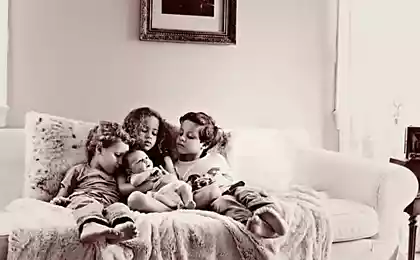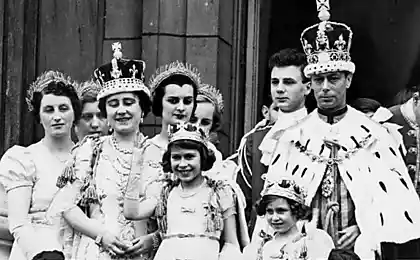582
Poisonous pedagogy: emotional child abuse
Emotional child abuse is any action that causes a state of emotional tension, which endangers the normal development of his emotional life.
Typically, the child's success parents respond with praise, with pride and joy. But sometimes parents react in the opposite way: indifference and irritation.
At first it evokes in the child with mixed feelings. In the future, the child who repeatedly have to deal with inadequate reactions of parents in response to his positive behavior, quickly lose motivation to achieve success and the accompanying sense of pride. He concludes that to be happy about the achievements is dangerous and wrong.
Eighty four million three hundred fifty seven thousand nine hundred forty two
Emotional violence includes the following acts against a child:
— isolation, that is, the alienation of the child from normal social interaction;
— sulkiness, refusal to discuss issues;
"harassment prohibitions" (for example, if the child is at certain times not complied with the lessons or didn't clean the bed, then behind it at a certain time implies the prohibition to watch TV or walk);
— insult;
— terrorizing, that is, repeatedly insulting a child's words and the formation of a stable fear;
— maintain a constant tension, intimidation, threats;
— the abuse, mockery; ·intimidation or punishment ("Another deuce or another trick at school and I get the belt»);
— moral decay (corruption), the involvement and the coercion of a child to actions that are contrary to societal norms and are detrimental to the child (coercion to commit theft, use of alcohol or drugs).
Emotional child abuse can be assumed in the case that you will notice that the parent is constantly:
— presents to the child overestimated requirements which he is not able to handle what creates low self esteem and leads to frustration;
— overly severely punishes the child;
— extremely critical of the child, accusing him of;
— angry and behaves eerily.
The presence of emotional abuse can be assumed, and based on the number of signs in a child, for example, if he:
— emotionally unresponsive, indifferent;
sad, subdepressive or had severe depression;
— sucking fingers, steadily swinging (autoerotic actions);
— withdrawn, brooding, or, conversely, aggressive;
— to "stick" to any adult in search of attention;
— experiencing nocturnal panic attacks, trouble sleeping;
— not showing interest in the games.
Physiological responses of the child can also attest to the fact that he is a victim of emotional abuse. This includes:
— day and night enuresis (incontinence);
— psychosomatic complaints: headaches, pain in the abdomen and region of the heart, complaints of feeling unwell, etc.;
— slow physical and overall development of the child.
Psychological violence
Psychological violence, despite the similarity with the emotional, stands in a separate category. Psychological violence is committed against the child an act which hinders the development of his potential abilities.
Forty five million forty two thousand seven hundred ninety
Psychological violence includes, for example, the frequent conflicts in the family and the unpredictable behaviour of the parents towards the child. Because of the mental violence inhibited the intellectual development of the child jeopardizes the adequate development of cognitive processes and adaptive capacity. He becomes easily vulnerable, reduced ability to self-esteem. The child develops socially helpless, easily gets into conflict situations and with high probability will be rejected by peers.
English psychologist Alice Miller in 1980 in the book "For your own good," formulated the so-called "poisoning pedagogy» – a complex of educational influences, which lead to the development of a traumatized personality:
Methods that achieve obedience, diverse:
— love is duty;
parents deserve respect, by definition – just because they are parents;
— children do not deserve respect just because they are children;
— high self esteem is harmful, and low – makes people altruistic;
— tenderness (strong love) harmful;
— to satisfy children's wishes wrong. Harshness, roughness and coldness is a good preparation for life;
better to pretend to be grateful than to openly Express ingratitude;
how you behave is more important than what you actually are;
— parents will not survive if they are hurt;
— parents can not talk nonsense, or to be guilty;
— parents are always right, they can't be wrong.
Conscientious adherence to the rules of "poisoning pedagogy" creates a dependent personality with low social tolerance, rigid, with "the murdered soul", which grows up, she becomes a "murderer". Parents genuinely believe that doing all for the good of the child, with his maiming.
The laws of intergenerational transmission is relentless, and everything is repeated again, but in the new generation.
Miller among the parental motives highlights the following:
– an unconscious need to move to another humiliation, which they themselves had once been;
– the need to give vent to suppressed feelings;
– need to have an active object to manipulate, to have it in your own;
– self-defense, including the need to idealize their own childhood and their own parents through the dogmatic application (transfer) of parent pedagogical principles to your child;
– fear of manifestations, which they themselves had once been suppressed, the manifestations that they see in their own children, those that must be destroyed in the Bud;
– the desire to take revenge for the pain that a parent once endured.
Obviously, if there is at least one of the above reasons, the chance to change the parent pattern of behaviour is rather low.
However, all this does not mean that children should grow up without any restrictions. Nonviolent communication based on respect from adults, tolerance for children's feelings of naturalness of pedagogical influence, i.e., dependent on pedagogical principles.published
From the book I. Malkina-Pykh "Extreme situation»
P. S. And remember, only by changing their consumption — together we change the world! ©
Source: /users/4
Typically, the child's success parents respond with praise, with pride and joy. But sometimes parents react in the opposite way: indifference and irritation.
At first it evokes in the child with mixed feelings. In the future, the child who repeatedly have to deal with inadequate reactions of parents in response to his positive behavior, quickly lose motivation to achieve success and the accompanying sense of pride. He concludes that to be happy about the achievements is dangerous and wrong.
Eighty four million three hundred fifty seven thousand nine hundred forty two
Emotional violence includes the following acts against a child:
— isolation, that is, the alienation of the child from normal social interaction;
— sulkiness, refusal to discuss issues;
"harassment prohibitions" (for example, if the child is at certain times not complied with the lessons or didn't clean the bed, then behind it at a certain time implies the prohibition to watch TV or walk);
— insult;
— terrorizing, that is, repeatedly insulting a child's words and the formation of a stable fear;
— maintain a constant tension, intimidation, threats;
— the abuse, mockery; ·intimidation or punishment ("Another deuce or another trick at school and I get the belt»);
— moral decay (corruption), the involvement and the coercion of a child to actions that are contrary to societal norms and are detrimental to the child (coercion to commit theft, use of alcohol or drugs).
Emotional child abuse can be assumed in the case that you will notice that the parent is constantly:
— presents to the child overestimated requirements which he is not able to handle what creates low self esteem and leads to frustration;
— overly severely punishes the child;
— extremely critical of the child, accusing him of;
— angry and behaves eerily.
The presence of emotional abuse can be assumed, and based on the number of signs in a child, for example, if he:
— emotionally unresponsive, indifferent;
sad, subdepressive or had severe depression;
— sucking fingers, steadily swinging (autoerotic actions);
— withdrawn, brooding, or, conversely, aggressive;
— to "stick" to any adult in search of attention;
— experiencing nocturnal panic attacks, trouble sleeping;
— not showing interest in the games.
Physiological responses of the child can also attest to the fact that he is a victim of emotional abuse. This includes:
— day and night enuresis (incontinence);
— psychosomatic complaints: headaches, pain in the abdomen and region of the heart, complaints of feeling unwell, etc.;
— slow physical and overall development of the child.
Psychological violence
Psychological violence, despite the similarity with the emotional, stands in a separate category. Psychological violence is committed against the child an act which hinders the development of his potential abilities.
Forty five million forty two thousand seven hundred ninety
Psychological violence includes, for example, the frequent conflicts in the family and the unpredictable behaviour of the parents towards the child. Because of the mental violence inhibited the intellectual development of the child jeopardizes the adequate development of cognitive processes and adaptive capacity. He becomes easily vulnerable, reduced ability to self-esteem. The child develops socially helpless, easily gets into conflict situations and with high probability will be rejected by peers.
English psychologist Alice Miller in 1980 in the book "For your own good," formulated the so-called "poisoning pedagogy» – a complex of educational influences, which lead to the development of a traumatized personality:
- Parents – the masters (not the servants!) dependent child. They define what is good and what is bad.
- The child is responsible for their anger. If they get angry – he is guilty.
- Parents should always be protected.
- Children's self-determination in life poses a threat to the autocratic parent.
- The child should be broken, and the sooner the better.
Methods that achieve obedience, diverse:
- psychological traps,
- deception,
- duplicity,
- evasions,
- excuses,
- tampering,
- scare tactic,
- the rejection of love,
- insulation,
- distrust,
- humiliation,
- the shaming – until the torture,
- obespylivanie and devaluation of adults, of everything that makes the child in the family ("your hands are not from that place grow – better don't touch anything!"; "Still nothing good happens!").
— love is duty;
parents deserve respect, by definition – just because they are parents;
— children do not deserve respect just because they are children;
— high self esteem is harmful, and low – makes people altruistic;
— tenderness (strong love) harmful;
— to satisfy children's wishes wrong. Harshness, roughness and coldness is a good preparation for life;
better to pretend to be grateful than to openly Express ingratitude;
how you behave is more important than what you actually are;
— parents will not survive if they are hurt;
— parents can not talk nonsense, or to be guilty;
— parents are always right, they can't be wrong.
Conscientious adherence to the rules of "poisoning pedagogy" creates a dependent personality with low social tolerance, rigid, with "the murdered soul", which grows up, she becomes a "murderer". Parents genuinely believe that doing all for the good of the child, with his maiming.
The laws of intergenerational transmission is relentless, and everything is repeated again, but in the new generation.
Miller among the parental motives highlights the following:
– an unconscious need to move to another humiliation, which they themselves had once been;
– the need to give vent to suppressed feelings;
– need to have an active object to manipulate, to have it in your own;
– self-defense, including the need to idealize their own childhood and their own parents through the dogmatic application (transfer) of parent pedagogical principles to your child;
– fear of manifestations, which they themselves had once been suppressed, the manifestations that they see in their own children, those that must be destroyed in the Bud;
– the desire to take revenge for the pain that a parent once endured.
Obviously, if there is at least one of the above reasons, the chance to change the parent pattern of behaviour is rather low.
However, all this does not mean that children should grow up without any restrictions. Nonviolent communication based on respect from adults, tolerance for children's feelings of naturalness of pedagogical influence, i.e., dependent on pedagogical principles.published
From the book I. Malkina-Pykh "Extreme situation»
P. S. And remember, only by changing their consumption — together we change the world! ©
Source: /users/4
6 exercises that will help to remove the sides
China has created an affordable analogue electrocreaser Tesla Model X























